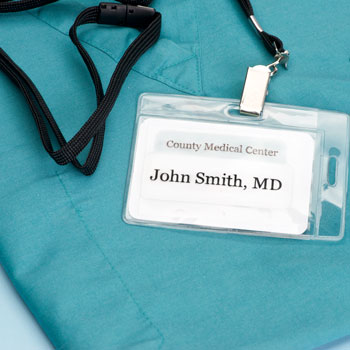Hello, my name is …
The first greeting with a patient can set the tone for how they see their doctor.
What's in a name? Would that which we call Dr. Williams by any other name treat as well?
Researchers asked 2023 Minnesota State Fair attendees a version of Shakespeare's famous question and found that people do have preferences about what their physicians call themselves when they first meet a patient in the hospital.

The most popular option, gaining 43.6% of the votes, was “Hi, I'm Alex Williams and I'll be your doctor,” followed by “Hi, I'm Dr. Alex Williams” with 30.5% and “Hi, I'm Dr. Williams,” with 18.8%. (Fewer than 5% selected the additional option of “Hi, I'm Dr. Alex.”)
The survey, results of which were published by the Journal of General Internal Medicine on April 24, also accepted comments and received several supportive of the “your doctor” phrasing.
“Many respondents who selected ‘your doctor’ explicitly commented that this contributed to a sense of personal touch and connection, plus providing a desirable flattening of the doctor-patient hierarchy,” the study authors noted.
Lead author Marissa Hendrickson, MD, associate professor and pediatric emergency physician at the University of Minnesota in Minneapolis, recently discussed the findings.
Q: What motivated you to study this question?
A: I've been working with my coauthors, Dr. Jordan Marmet and Dr. Michael Pitt, for a long time, doing jargon research. Our interest is in medical communication, and we've been doing these surveys looking at what the public thinks of the way we communicate. This question came up in response to two different issues. One is [an Annals Fresh Look] blog post that we referenced in the article: A medical student came up with the idea of saying “I'll be your medical student” to patients as a way of really building rapport, like “I'm here for you. I'm going to stick with you.” That intrigued us.
Also, I have a thing about first names, and I always have. I went to alternative public schools when I was a kid. We called the teachers by their first names, and I just kind of hate when people act like they don't have a first name. When people say, “Hi, Marissa, I'm Dr. Smith,” I think, “I'm actually older than you and a doctor myself, for what that's worth,” so it's a bit of a pet peeve.
Q: What did you think of the survey results?
A: I was a little surprised that so many people wanted it framed like that: Almost 80% of our respondents selected one of the options with a first name included. Only 18% liked “I'm Dr Williams.” I would have thought that would have been higher, because it is such a common way that people do it. I was not surprised that “I'll be your doctor” came out on top, because I think it's great, and I really am excited to get this out there.
Q: How have you usually introduced yourself to patients? Did this research affect that?
A: I used to say, “I'm Marissa Hendrickson, I'm one of the doctors,” or “I'm the supervising doctor,” because I'm often the supervising doctor. Before we even did this research, after I had seen that blog post, I added the “your,” so now I say, “I'm Marissa Hendrickson, I'll be your doctor.” If I'm working with a resident, and the patient has already met them, I'll say, “I'm Marissa Hendrickson, I'm the supervising doctor.”
Q: Is it useful to add specificity, like “supervising” or “hospitalist”?
A: People do not know what a hospitalist is. We have done a couple of papers on specialty names. So I think we need to be clearer about what that means. It's tricky, because if you want to get the “your” in there, how do you say it? If you're working alone, I think you could say, “I'll be your doctor while you're in the hospital,” and then if they seem to want more information, “I'm a hospitalist. That's a physician who only cares for people who are in the hospital.” If you're working as part of a team, you have to explain that to them. I know my colleagues tend to say, “I'm the pediatrician leading the team,” or something like that, to make it clear where they fit with the med students and residents that the patient may already have met.
Q: Do you think there's reason to vary your introduction depending on which patients you're talking to?
A: I got into a conversation about this with a friend who's an adult rheumatologist, and she said she really likes to keep the formality as a way to demonstrate expertise. That's one of the areas that, at some point, we'd like to figure out how to study. Does it vary by age? I know a lot of the young resident doctors feel the need to say, “I'm Dr. Williams,” so patients know I'm a doctor because I'm young-looking, I'm female, I've got an accent, or whatever. There are different things that feed into how well people can skate by on that privilege. People have to make their own calculation based on their own demographics and how they present to patients.
To me, the key thing, and what I was talking about with my rheumatologist friend, is that we should match how we address patients. If you are talking to older patients and want to say, “Hi, Mr. Jones, I'm Dr. Hendrickson,” then that's fine. But if you say “Hi, Michael, I'm Dr. Hendrickson,” and the patient might even be older than you, I experience that as disrespectful. Some of our respondents picked up on that, too, and said in their comments that they felt it's a matter of respect. If somebody really prefers, for whatever reason, to stick with the title and the last name only for themselves, then presuming that for the patients and letting the patients correct them might be another take-home from this study.
Q: Do you have any other take-home messages for physicians?
A: Start from a place of respect, and don't shy away from a sense of equality. Some people have classically preferred to maintain that sense of hierarchy: “I am the doctor, you're here for my expertise.” That's fair. However, our patients, in their responses and their comments, did say that they valued flattening of that hierarchy and [creating] that sense of partnership. Use your introduction to establish that: “I'm here as a partner. I have one kind of expertise. I went to med school and residency, but you have the expertise in yourself.” As a patient, they bring an equal or greater level of expertise in their own body and their own experiences.
Q: Are you working on additional research in this area?
A: We are still working on a couple of papers that came out of that same set of surveys. One that I'm really excited about is about how people perceive the things they read in our notes, what we're calling written jargon. Now with open notes, people have access to our clinical notes pretty quickly after we sign them, and medical notes have traditionally been a professional-to-professional communication, so they've been filled with jargon and things that other research has shown can be perceived as disrespectful. We tested some alternative ways of saying things that people often say in notes that could grate on people. Hopefully it'll be out there soon.



